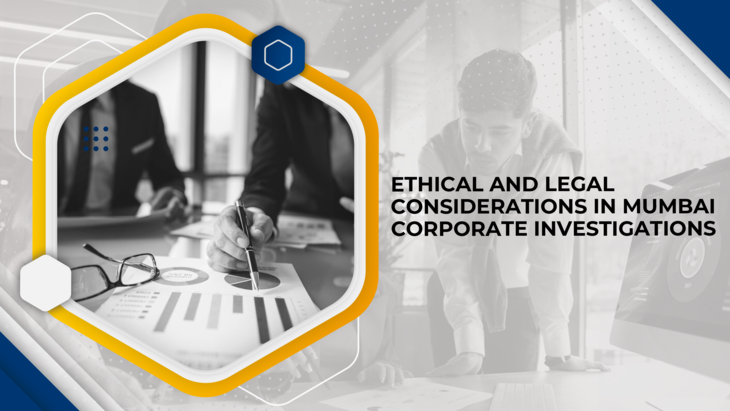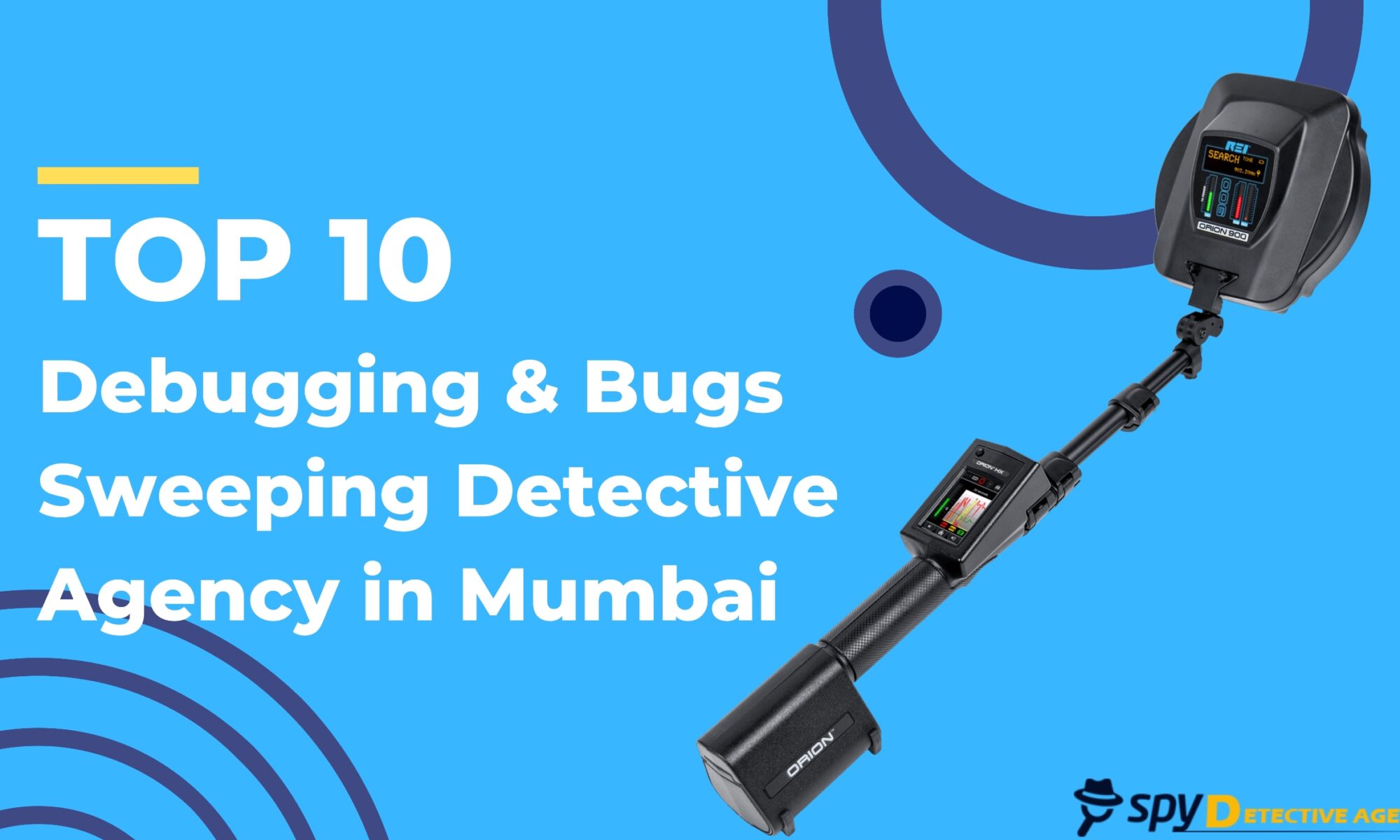Mumbai The capital of Maharashtra and the financial capital of India have been important business centers for different scales of businesses. However, growth brings out the possibility of vice or mishandling of the company’s resources. Whenever there is an indication of fraudulent activity either within an organization or in the operations of an organization, then a corporate investigation is required. However, entering this realm of investigation raises questions about ethics and the law. Below is a step-by-step guide to this blog post that encompasses the ten essential ethical and legal issues to consider when undertaking corporate investigations in Mumbai.
Best Practices for Ethical and Legal of Mumbai Corporate Investigations
Apart from the legal obligations, the business’s ethical standards are the solid foundation of a corporate investigation. Here are some key ethical principles to uphold:Here are some key ethical principles to uphold:
Confidentiality: Data security is a critical concern in any context since there is always a need to safeguard such valuable information. This has to do with employee details, financial information, and any other collection realized in the course of an investigation. Adhere to information security policies and procedures in an effort to allow the information to be accessed only by authorized persons.
Objectivity: Another factor that should be good enough is that the investigators must look at the investigation independently. They must not have a biased mind and determine the findings merely based on the facts that they have collected.
Fairness: the judgment of all the individuals who are involved in the investigation should be done fairly and respectfully. This includes those suspected of engaging in the wrongdoing, other persons who may hear the allegations or statements of the whistleblowers, and other relevant witnesses. Make sure they are given the information that will allow them to speak their mind, and make sure that proper procedure is followed.
Proportionality: There are some guidelines that practitioners recommend in relation to the scope of the investigation to be conducted, and these are as follows: It is important not to offend boundaries or gather too many measures that are not pertinent to the case.
Transparency: It is crucial to keep the company’s board of directors and senior management aware of the developments being made in the investigation. On the other hand, be sensitive when handling active investigations or public information that requires discretion.
Navigating the Corporate Regulatory Landscape
The legal framework in India provides the boundaries for conducting corporate investigations. Here’s a breakdown of some key legal considerations:
- The Indian Penal Code (IPC): The IPC outlines various criminal offenses, including fraud, cheating, forgery, and criminal breach of trust. If the investigation reveals evidence of a potential criminal offense, it is crucial to report it to the appropriate authorities.
- The Companies Act, 2013: This act governs the formation, operation, and winding up of companies in India. It includes provisions for conducting investigations into the affairs of a company, such as those related to mismanagement or fraud.
- Information Technology Act, 2000: With the rise of digital evidence, the Information Technology Act becomes crucial. This act outlines regulations for data collection, storage, and transmission. Ensure compliance with these regulations when gathering and handling electronic evidence.
- Employee Rights: Indian labor laws protect employee rights, including privacy and freedom from harassment. Be mindful of these rights during the investigation and avoid any practices that may violate them.
Check Out: Detective Agency in Mumbai For Employee Investigations!
Building a Strong Foundation: Planning and Execution
Ethical and legal considerations are intertwined throughout the investigative process. Here’s a breakdown of key stages with ethical and legal considerations in mind:
- Planning the Investigation:
- Defining the Scope: Clearly define the scope of the investigation, outlining the objectives and the timeframe. This helps ensure the investigation remains focused and prevents overreach.
- Building the Team: Assemble a qualified investigative team with expertise in relevant areas like law, forensics, and accounting. Consider the ethical implications of the team’s composition and potential conflicts of interest.
- Conducting the Investigation:
- Data Collection: Gather evidence ethically and legally. Obtain proper authorization for accessing data and ensure electronic evidence is collected and stored following the Information Technology Act.
- Interviews: Conduct interviews with witnesses and suspected individuals in a professional and respectful manner. Inform them of their rights and obtain informed consent before proceeding.
- Reporting and Follow-up:
- Reporting Findings: Prepare a comprehensive report outlining the findings of the investigation in a clear and concise manner. Maintain confidentiality while ensuring the report is legally defensible.
- Remedial Action: Based on the investigation’s findings, the company may need to take appropriate remedial action. This could involve disciplinary measures, legal proceedings, or changes in company policies. Ensure taking such actions within the legal framework.
Seeking Guidance: When to Involve Legal Counsel
While navigating the complexities of corporate investigations, involving legal counsel is crucial in several situations:
- When the investigation involves potential criminal activity: Reporting such activity to the authorities may be required, and legal guidance is essential to navigate this process.
- When dealing with sensitive employee rights issues: Employee rights are protected by law, and legal counsel can help ensure the investigation adheres to all relevant regulations.
- When complex legal issues arise: Investigations can uncover complex legal issues, such as those related to data privacy or intellectual property. Legal counsel can provide expert guidance.
Conclusion: Ethical and Legal Harmony of Mumbai Corporate Investigations
Conducting a Mumbai Corporate Investigations requires a delicate balance between ethical conduct and legal compliance. By adhering to the ethical principles outlined above and navigating the legal landscape with care, investigators can ensure a successful outcome. Here are some concluding thoughts:
- Building Trust: Maintaining ethical conduct throughout the investigation fosters trust with all stakeholders, including employees, management, and regulatory bodies.
- Mitigating Risk: Following legal guidelines helps mitigate the risk of legal challenges or sanctions arising from the investigation.
- Promoting Transparency: Ethical and legal investigations promote transparency within the company, fostering a culture of accountability and good governance.
Remember, a well-conducted corporate investigation can not only uncover wrongdoing but also serve as a catalyst for positive change within the organization. By prioritizing both ethics and legal considerations, investigators can ensure a fair, transparent, and ultimately successful process.
Check it now: Detective agency in Delhi
Additional Considerations:
- Data Privacy Regulations: As data privacy regulations like the General Data Protection Regulation (GDPR) gain global prominence, staying updated on relevant data privacy regulations is crucial, especially if the investigation involves international data transfers.
- Cultural Nuances: Mumbai, and India as a whole, has its own cultural nuances. Being mindful of these cultural sensitivities during the investigation can help foster cooperation and understanding.
By keeping these additional considerations in mind, investigators can further strengthen their approach to corporate investigations in Mumbai. Remember, ethical and legal considerations are not roadblocks, but rather guideposts that lead to a successful and impactful investigation.



